The Hellenic Community of Alexandria (EKA)
Intro | The Founding & Early History of EKA | EKA in the 20th Century | EKA Today | EKA - Activies | View page in Greek (will open in a new window) | Past & Present Officals of EKA
The Greek population of Alexandria, Egypt, once numbered some 150,000. Traders, businessmen, philanthropists and artists moved among the cosmopolitan society of Alexandria. Their legacy is still to be seen today, not only in their historical influence, their writings, teachings and their influence on the society of Egypt and Greece, but also in the structures which they designed and built - hospitals, churches, schools, public buildings and mansions.
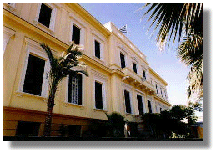 Sadly, the Hellenic community of Alexandria has dwindled to a mere 800
and many of the businesses, clubs, hospitals and schools have closed,
but many of the churches and grand neo-classical buildings remain.
Sadly, the Hellenic community of Alexandria has dwindled to a mere 800
and many of the businesses, clubs, hospitals and schools have closed,
but many of the churches and grand neo-classical buildings remain.
The Orthodox Patriarchate of Alexandria and All Africa has its historical base in Alexandria where it was founded by the Apostle St. Mark in 63 AD. The Patriarchate is responsible for the spiritual and religious well-being of some 150,000 Greeks living in Africa as well as a further 500,000 of the Orthodox Christian faith throughout the region.
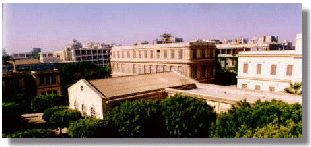 The Hellenic Community of Alexandria (EKA) aims to ensure the best
possible opportunities and conditions for the continuation of Hellenism
in Egypt and cultivate cultural exchange between Greece and Egypt. To
this end EKA proposes the foundation and operation of a School of
Archaeological and Classical Studies bearing the name "Alexander the
Great", within the buildings of the last Greek Quarter of Chatby,
Alexandria - an area of 40,000 square metres, entirely owned by the
Hellenic Community of Alexandria.
The Hellenic Community of Alexandria (EKA) aims to ensure the best
possible opportunities and conditions for the continuation of Hellenism
in Egypt and cultivate cultural exchange between Greece and Egypt. To
this end EKA proposes the foundation and operation of a School of
Archaeological and Classical Studies bearing the name "Alexander the
Great", within the buildings of the last Greek Quarter of Chatby,
Alexandria - an area of 40,000 square metres, entirely owned by the
Hellenic Community of Alexandria.
The Founding & Early History of EKA
1843-1854 Even before the formal establishment of EKA in 1843, the small Hellenic community of Alexandria was maintaining a school and hospital, but the newly-born organisation, then bearing the name of the Hellenic-Egyptian Community, took as its prime and basic aim the foundation of more complete and modern schools, churches and hospitals to serve the Hellenes of Alexandria.
The protagonist and main financial backer of this triptych vision was MICHAIL TOSITSAS first president of EKA and Consul General of Greece in Alexandria, who is considered to have been the father of Egyptian Hellenism.
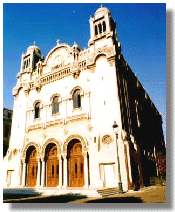 In 1847 Tositsas donated a plot of land for the building of the first
Community church - the Church of
Evangelismou tis Theotokou
(the Church of the Annunciation of the Virgin) - which opened in 1856
and still operates today. It was here that His Beatitude Petros VII,
Pope and Patriarch of Alexandria and All Africa was enthroned in March
1997.
In 1847 Tositsas donated a plot of land for the building of the first
Community church - the Church of
Evangelismou tis Theotokou
(the Church of the Annunciation of the Virgin) - which opened in 1856
and still operates today. It was here that His Beatitude Petros VII,
Pope and Patriarch of Alexandria and All Africa was enthroned in March
1997.
When diplomatic relations between Greece and Turkey were broken off in 1854 due to the Greek stance towards the Russian-Turkish War, Tositsas and many other Greeks were obliged to leave the country.
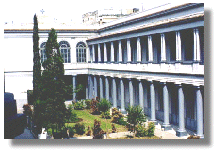 1854-1857
Michail Tositsas financed the first Greek Community School, which was
opened bearing his name, in 1854, under the presidency of his successor
Stefanos Tzitzinias
. The school operated for 114 years before closing in 1968. The building
now houses the Greek Orthodox Patriarchate of Alexandria and All Africa.
1854-1857
Michail Tositsas financed the first Greek Community School, which was
opened bearing his name, in 1854, under the presidency of his successor
Stefanos Tzitzinias
. The school operated for 114 years before closing in 1968. The building
now houses the Greek Orthodox Patriarchate of Alexandria and All Africa.
As EKA's financial capacity developed so its activities and good works grew. It became an example for other expatriate Greek communities in Egypt and generally throughout the Middle East and later Africa.
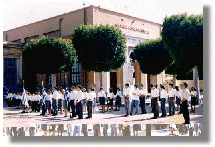 1857-1885
There followed the Presidents Dimitrios Rizos (1857-1862), Constantinos
Charalambis (1862-1863), Sophocles Constantinidis (1863-1871) and
Theodoros Rallis (1871-1885), each continuing the philanthropic work of
the Community. One of the main legacies of this time was the
establishment of a new hospital, St. Sofronios'. This was the hospital
which energetically served the Greeks of Alexandria, where German R.
Koch, with the help of Greek doctors Kartoulis and Valasopoulos, would
isolate the cholera virus during the epidemic of 1883, which resulted in
the development of a vaccine against the disease, and where Constantine
Cavafy died in 1933.
1857-1885
There followed the Presidents Dimitrios Rizos (1857-1862), Constantinos
Charalambis (1862-1863), Sophocles Constantinidis (1863-1871) and
Theodoros Rallis (1871-1885), each continuing the philanthropic work of
the Community. One of the main legacies of this time was the
establishment of a new hospital, St. Sofronios'. This was the hospital
which energetically served the Greeks of Alexandria, where German R.
Koch, with the help of Greek doctors Kartoulis and Valasopoulos, would
isolate the cholera virus during the epidemic of 1883, which resulted in
the development of a vaccine against the disease, and where Constantine
Cavafy died in 1933.
1885-1899 In 1885 Alexandrian GEORGE AVEROF took over the presidency. He and his fellow benefactors C. and G. Zervoudakis, C. Salvagos and Emm. Benakis, undertook great philanthropic works.
In 1878 the Community High School was founded. It was named after Averof in 1886 and still operates today as the Averof High Schools.
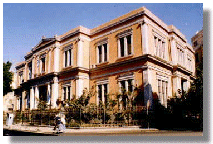 As the number of Greek children in the city continued to grow EKA, built
the Averof Girls' School which opened in 1896. Over the next three
generations thousands of Greek pupils passed through the doors of the
school. After its closure in 1963, the buildings and playing fields were
offered to the Greek State which established the first Hellenic Trade
and Exhibition Centre there.
As the number of Greek children in the city continued to grow EKA, built
the Averof Girls' School which opened in 1896. Over the next three
generations thousands of Greek pupils passed through the doors of the
school. After its closure in 1963, the buildings and playing fields were
offered to the Greek State which established the first Hellenic Trade
and Exhibition Centre there.
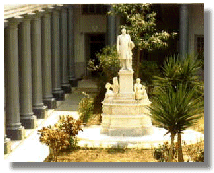 Averof, the great national benefactor is remembered for his
contributions in Greece too. The building of the Metsovion Polytechnic
in Athens had begun with funds from Alexandrians Tositsas and Stournaras
and was completed by Averof. He was also responsible for the building of
the School of Evelpidon, the juvenile prison in Athens and the
Agricultural School in Larissa. He donated large sums of money and
agricultural land to the Community of Metsovo and funded the Odeion
Music School in Athens. He also donated one million drachmas for the
restructuring of the Athens stadium. The battleship "G. Averof", which
played an important role in the history of the Greek navy, was paid for
largely with Averof's personal contribution.
Averof, the great national benefactor is remembered for his
contributions in Greece too. The building of the Metsovion Polytechnic
in Athens had begun with funds from Alexandrians Tositsas and Stournaras
and was completed by Averof. He was also responsible for the building of
the School of Evelpidon, the juvenile prison in Athens and the
Agricultural School in Larissa. He donated large sums of money and
agricultural land to the Community of Metsovo and funded the Odeion
Music School in Athens. He also donated one million drachmas for the
restructuring of the Athens stadium. The battleship "G. Averof", which
played an important role in the history of the Greek navy, was paid for
largely with Averof's personal contribution.
The beginning of the 20th century saw an increase in the population of Greeks in Alexandria which is said to have reached 150,000, and an improvement in the standards of living, which in many respects were superior to those in Greece itself.
1900-1911 CONSTANTINOS SALVAGOS from Chios, one of the founders of the National Bank of Egypt, a great trader, banker and an honoured and important member of cosmopolitan Alexandrian society, was elected President following Averof. But his presidency was short lived as he died suddenly in 1901.
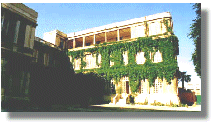 Salvagos' successor was the great
EMMANUEL BENAKIS
from Syros, a cotton merchant and founder of the internationally known
firm of Horemis-Benakis. Under the Presidency of Benakis, EKA set up its
offices in the Hellenic Quarter of Chatby. It is the "Last Quarter" of
which we speak today and where EKA's offices are still to be found.
Salvagos' successor was the great
EMMANUEL BENAKIS
from Syros, a cotton merchant and founder of the internationally known
firm of Horemis-Benakis. Under the Presidency of Benakis, EKA set up its
offices in the Hellenic Quarter of Chatby. It is the "Last Quarter" of
which we speak today and where EKA's offices are still to be found.
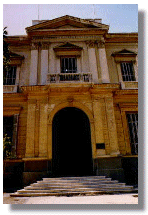 The Salvagos family initiated the building of the Hellenic quarter of
Chatby in memory of Constantine Salvagos. In 1906 the Salvagos Trade
School, which had been Averof's dream, was established. It later
developed into the College of Trade and operated until 1972.
The Salvagos family initiated the building of the Hellenic quarter of
Chatby in memory of Constantine Salvagos. In 1906 the Salvagos Trade
School, which had been Averof's dream, was established. It later
developed into the College of Trade and operated until 1972.
In 1907 the Zervoudakis School merged with the Averof Boys and Girls High Schools and a girls trade section, a Practical Girls High School and School of Dressmaking were also established.
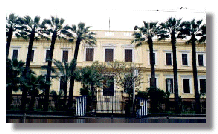 In 1908 Benakis founded the Benakis Community Kitchens to serve the
needy of the community. This service is still offered today.
In 1908 Benakis founded the Benakis Community Kitchens to serve the
needy of the community. This service is still offered today.
In 1909 Emmanual Benakis and his wife, Virginia, established the Benakis Girls Orphanage in a grand building within the quarter. The orphanage was closed in 1970 and since 1972 it has housed the Consulate General of Greece in Alexandria.
Under Benakis the Tositsas School underwent renovations and the hospital was upgraded to include departments of Ophthalmology, Pathology, Contagious Diseases, First Aid, Nurses School etc.
Benakis ensured the provision of aid to the Macedonian struggle. King George at the time expressed his appreciation and gratitude towards the Hellenic Community of Alexandria for its help to the Greek nation. The Greeks of Alexandria regularly took part in collections for Greek causes such as the support of earthquake victims.
In 1911 Benakis resigned from the presidency, repatriated to Greece and devoted himself to the service of his country as Minister of Agriculture and also as Mayor of Athens.
Antonis Benakis, son of Emmanuel, was the founder of both the Greek boy scouts in Egypt, but also of the Egyptian scouts. He moved to Athens and on the death of his father donated the family villa to the Greek state. It now houses the Benakis Museum in Athens.
Penelope, daughter of Emmanuel Benakis, married the journalist Stefanos Delta, and became one of the best-known Greek writers of children's books, Penelope Delta.
1911-1919 MICKES SYNADINOS from Chios, who was particularly well loved by the community, followed Benakis as President of EKA. Synadinos was one of the founders of the Greek Philharmonic Orchestra and President of the Mohammed Ali Club which played an important role in Alexandrian Society. During the years of his presidency EKA sent aid to the Greek troops in both the Balkan Wars and the First World War.
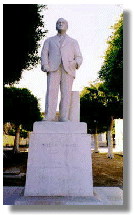 1919-1948
When Synadinos died in 1919, he was succeeded as President by
MICHAIL SALVAGOS
, son of Constantine, who became one of the most productive and
significant Presidents of EKA and was the longest serving of all EKA
Presidents to date holding the post for 29 years, until 1948.
1919-1948
When Synadinos died in 1919, he was succeeded as President by
MICHAIL SALVAGOS
, son of Constantine, who became one of the most productive and
significant Presidents of EKA and was the longest serving of all EKA
Presidents to date holding the post for 29 years, until 1948.
Under the Presidency of Salvagos the EKA Offices were renovated, the new Familiadis Community school was built for the Greek children in the area of Attarin, named after its benefactor, and the Cairo Railway Station was built in Alexandria.
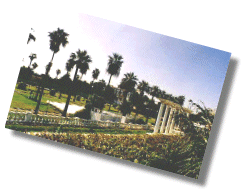 The Community Old People's Home was established in 1925 on donations by
Antonis Antoniadis, son of Sir John Antoniadis who had donated the
family mansion, grounds and gardens to the Alexandria Town Council. Even
today the Alexandria Town hall is named the Antoniadis Mansion and
Antoniadis Gardens are open to the public and house the Alexandria Zoo.
The Community Old People's Home was established in 1925 on donations by
Antonis Antoniadis, son of Sir John Antoniadis who had donated the
family mansion, grounds and gardens to the Alexandria Town Council. Even
today the Alexandria Town hall is named the Antoniadis Mansion and
Antoniadis Gardens are open to the public and house the Alexandria Zoo.
Under Salvagos' presidency a huge, modern and well-equipped new hospital was built with the aid and support of the wealthy Kotsikas family.. EKA took charge of the running of the famous Kotsikeio Hospital which opened in 1938. It played a vital role during World War II when the Greek Army and Greek Government took refuge in Egypt due to the German occupation of Greece. The 250-bed hospital, served Greeks and Egyptians and the allied forces during the War. It was sold to Egypt by the Greek state in 1964.
During Mickes Salvagos' term, EKA reached the height of its glory, but after his death in 1948, it began to decline. The Hellenes of Alexandria began to leave for Greece and other countries because of unfavourable conditions in their host country - adverse laws relating to foreigners, the redistribution of agricultural land and later compulsory nationalisation of private companies.
1948-1954 After Salvagos' death, NIKOLAOS VATIMBELAS took over the presidency until industrialist, DIMITRIOS ZERBINIS from Lesvos, was elected President later that year. In 1949 the Community Vocational School was set up. Operating at first as a night-school and later as a day-school, it played a significant role in the community providing training for the young Greeks of the city.
1954-1973 When Zerbini left the Presidency in 1954, ANASTASIOS THEODORAKIS , son of a great Alexandrian family, was elected to the post. Under his presidency, EKA attempted to salvage as much as possible of past achievements. It was no longer a time of creation but of dissolution. By the end of Theodorakis' Presidency the Antoniadis Old People's Home had closed and removed to the Kaniskeris Orphanage building - the building which had once housed the young of a thriving community, now housed the elderly of a dwindling one. The Aristofronios School, which was established in 1895 next to the church of the Prophet Elias by the then Hellenic Community of Ramle in the neighbourhood of Giannakles also closed, as did the Sports ground of the church.
1973-1983 The successful lawyer COSTAS SANDIS followed Theodorakis as President. He increased efforts to retrench, organise and ensure strategically the continuation of the Hellenic presence in Alexandria.
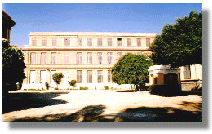 By 1978, when
COSTAS RAPPAS
took over from Sandis, EKA was restricted to the last Greek Quarter of
Chatby where the Averof Junior and High Schools are still housed and to
where, years previously, the Offices of EKA and both the Greek General
Consulate and Cypriot Consulate had been moved.
By 1978, when
COSTAS RAPPAS
took over from Sandis, EKA was restricted to the last Greek Quarter of
Chatby where the Averof Junior and High Schools are still housed and to
where, years previously, the Offices of EKA and both the Greek General
Consulate and Cypriot Consulate had been moved.
It was commonly accepted that the countdown had begun for the Hellenic presence in Alexandria.
1984-1990 Rappas died in Athens in 1983. He was succeeded by Alexandrian businessman, PANAGIOTIS SOULOS During his term EKA succeeded in slowing down the rate of emigration, but the greatest achievement was, that even in these difficult times, the economic position of EKA was restored and the Community was once again financially independent.
In 1990 another Alexandrian businessman, STEFANOS P. TAMVAKIS , assumed the presidency. At the age of 37, he was the youngest ever elected President of EKA.
AIMS
Stefanos P. Tamvakis and his eight colleagues of the Executive Committee of EKA are attempting to rebuild and extend the life of the Hellenic community in Egypt. They worked closely with the late Patriarch of Alexandria and All Africa H.B. Parthenios III and continue with the co-operation and support of the current Patriarch H.B. Petros VII, as they aim to turn the tide and continue a dynamic Hellenic presence in Alexandria into the twenty-first century:
- EKA is working closely with the World Council of Hellenes Abroad (SAE) a non-government, non-profit organisation which represents expatriate Greeks. In 1995, Stefanos P. Tamvakis was elected Regional President of the Asia-Africa region of SAE and the Regional Office of SAE, which represents Greeks living throughout the two continents, was set up within the buildings of EKA. Through SAE the Hellenic Community aims to reach out to other Hellenic Communities abroad and take an active part in the creation and support of ecumenical Hellenism.
- EKA is making every effort to strengthen ties and encourage cultural exchange and a healthy trading relationship between Greece and Egypt and is proud to say that ties between the Hellenic community, the Government of Greece and the Egyptian Authorities have never been closer.
- EKA is taking every opportunity to promote the name of Alexandria and the activities of the Hellenes of Alexandria as well as opportunities for Greeks in Egypt and Egyptians in Greece through Egyptian-Greek leagues and organisations in both countries.
- EKA proposes to breathe new life into the last Greek Quarter of Chatby, Alexandria, by establishing a School of Archaeological and Classical Studies bearing the name "Alexander the Great" , so ensuring the continuation of an active Hellenic presence and constant cultural exchange.
Churches : EKA maintains and runs the following six Churches: The Church of the Annunciation of the Virgin (Evangelismou tis Theotokou), The Church of the Great Archangels (Pammegiston Taxiarchon) St. George's Church (Agiou Georgiou) situated in the grounds of the Retirement Home, The Church of Prophet Elias (Prophiti Elias) St. Katherine's Church (Agias Aikaterinis) in the building of the old Benakis Orphanage and present day Consulate General of Greece The Church of the Dormition of the Virgin (Koimiseos tis Theotokou) situated in the grounds of the Hellenic Community Cemetery.
Schools : There are currently 75 pupils attending the Hellenic Community Schools (Averof Junior and Senior High Schools and Tositsas-Pratsikeios Junior School, Nursery School and Day-Care Centre).
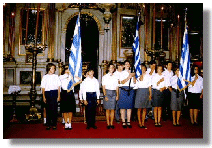 The Schools, which are staffed by teachers posted to Alexandria by the
Greek Ministry of Education and by local teaching staff, follow the
curriculum approved by the Greek Authorities and in addition offer
Arabic Language courses for pupils native to Egypt. Facilities include:
school doctor and clinic, Physics and Chemistry labs, gymnasium, playing
fields, library, Computer Studies room. and a school bus. There is also
a large theatre with a seating capacity of 400.
The Schools, which are staffed by teachers posted to Alexandria by the
Greek Ministry of Education and by local teaching staff, follow the
curriculum approved by the Greek Authorities and in addition offer
Arabic Language courses for pupils native to Egypt. Facilities include:
school doctor and clinic, Physics and Chemistry labs, gymnasium, playing
fields, library, Computer Studies room. and a school bus. There is also
a large theatre with a seating capacity of 400.
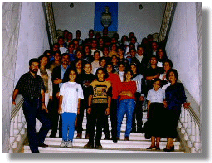 Despite the small number of pupils the schools have a full calendar of
sports, social and cultural events including: Celebration of Greek
National Holidays, Scouts and Guides, Greek Country dancing, Hellenic
Night, School trips, Sports Day, Theatrical games
Despite the small number of pupils the schools have a full calendar of
sports, social and cultural events including: Celebration of Greek
National Holidays, Scouts and Guides, Greek Country dancing, Hellenic
Night, School trips, Sports Day, Theatrical games
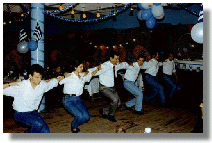
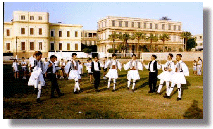
Retirement Home : The Antoniadis-Kaniskeris Retirement Home, named after the two great Alexandrian philanthropists, is now housed in the old Kaniskeris Orphanage building. Today the Home houses and cares for 54 elderly folk.
Community Services : Community Services are provided by EKA. Medical examination, home visits, treatment and the provision of medical supplies are offered free of charge to the needy of the community. Food is provided for the residents of the Old People's Home and the needy of the community by the Benakis Community Kitchens.
Scholarships : EKA offers financial help to the youth of the community who wish to continue with Higher Education. Currently 18 Alexandrians studying in Greece and 3 who are studying in Egypt receive scholarships from EKA.
In 1993, EKA celebrated its 150th Anniversary which was attended by over two thousand people many of whom were ex-Alexandrians who had travelled from all over the world to attend.
Past & Present Officals of EKA
THE FIRST GOVERNING BOARD OF EKA - 1843
- PRESIDENT : MICHAIL TOSITSAS
- GOVERNING BOARD
- G.ADEP
- D. ARGYRIDIS
- I.G. IVOS
- MEG. KALOGIANNIS
- D. KASDAGLIS
- G.MINOTOS
- IOSIF BACHADOURIS
- D. POTESSAROS
- STAM. PROIOS
- ANAST. SOTIRIS
- G. PESTELMATZOGLOUS
- H. TZAKALIS
CURRENT EXECUTIVE COMMITTEE OF EKA - 1997
PRESIDENT : STEFANOS P. TAMVAKIS
EXECUTIVE COMMITTEEHONORARY PRESIDENTS OF EKA
- THEODOROS RALLIS (1885)
- EMMANOUEL BENAKIS (1911)
- THEOCHARIS KOTSIKAS (1930)
- DIMITRIOS THEODORAKIS (1952)
- THEODOROS KOTSIKAS (1953)
- ANASTASIOS THEODORAKIS (1974)
- PANAGIOTOS SOULOS (1990)
PRESIDENTS OF EKA
- MICHAIL TOSITSAS (1843-1854)
- STEFANOS TZITZINIAS (1854-1857)
- DIMITRIOS RIZOS (1857-1862)
- CONSTANTINOS CHARALAMBIS (1862-1863)
- SOPHOCLIS CONSTANTINIDIS (1863-1871)
- THEODOROS RALLIS (1871-1885)
- GEORGIOS AVEROF (1885-1899)
- CONSTANTINOS SALVAGOS (1900-1901)
- EMMANOUEL BENAKIS (1901-1911)
- MICKES SYNADINOS (1911-1919)
- MICHAIL SALVAGOS (1919-1948)
- NIKOLAOS VATIMBELAS (1948-1948)
- DIMITRIOS ZERBINIS (1948-1954)
- ANASTASIOS THEODORAKIS (1954-1973)
- COSTAS SANDIS (1973-1978)
- COSTAS RAPPAS (1978-1983)
- PANAGIOTIS SOULOS (1984-1990)
- STEFANOS P. TAMVAKIS (1990- )